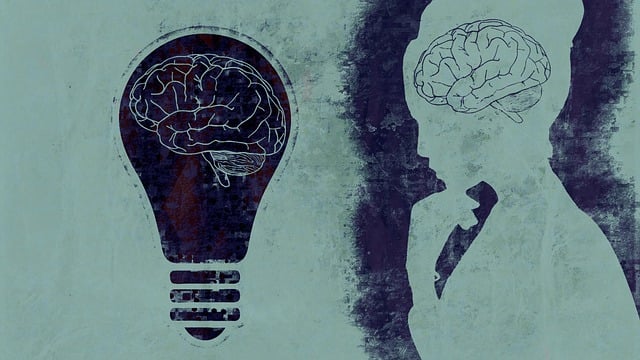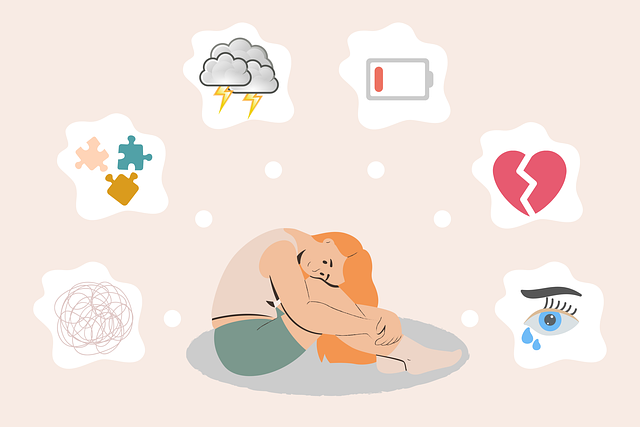Aurora Bipolar Disorder Therapy (ABDT) demands heightened public awareness for timely diagnosis and effective management. Recognizing its diverse symptoms reduces stigma, encouraging affected individuals to seek help. Comprehensive education on burnout prevention, self-care, stable routines, and support networks empowers those with ABDT to actively manage their condition. Public awareness campaigns, highlighting mental health aspects, combat stigma and promote understanding, leading to improved treatment outcomes. These campaigns should use authentic narratives, visual aids, interactive platforms, and Mental Wellness Journaling exercises for maximum impact. Success is evaluated through surveys, analytics, and feedback, assessing mental wellness awareness, open dialogue, and community engagement improvements related to ABDT.
Public awareness campaigns play a pivotal role in combating mental health challenges, such as Aurora Bipolar Disorder. This article delves into the development and impact of initiatives aimed at educating the public about this complex condition. We explore strategies for effective campaign creation, focusing on clarity and empathy. Understanding Aurora Bipolar Disorder is crucial, as these efforts can lead to improved support systems and reduced stigma. By measuring success through evaluation, we can enhance the reach and effectiveness of Aurora Bipolar Disorder therapy campaigns.
- Understanding Aurora Bipolar Disorder: Unveiling the Condition
- The Role of Public Awareness Campaigns in Mental Health
- Strategies for Effective Campaign Development and Implementation
- Measuring Success: Evaluating the Impact of Aurora Bipolar Disorder Therapy Campaigns
Understanding Aurora Bipolar Disorder: Unveiling the Condition

Aurora Bipolar Disorder, a mental health condition marked by extreme mood swings, has long been shrouded in mystery and stigma. However, increased awareness is crucial for early detection and effective Aurora Bipolar Disorder Therapy. Understanding this complex disorder involves recognizing its symptoms, which can range from intense mania to profound depression, often affecting an individual’s ability to function daily. Educating the public about these fluctuations fosters empathy and encourages those struggling to seek help without fear of judgment.
Through comprehensive campaigns that highlight resilience building and confidence boosting strategies, individuals living with Aurora Bipolar Disorder can learn valuable burnout prevention techniques. This includes promoting self-care practices tailored to managing mood episodes, ensuring stable routines, and fostering strong support networks. By integrating these Burnout Prevention Strategies for Healthcare Providers into public discourse, we create a more inclusive environment where those affected can thrive rather than simply survive.
The Role of Public Awareness Campaigns in Mental Health

Public awareness campaigns play a pivotal role in shaping societal perceptions about mental health, with significant implications for access to care and support. By shedding light on various aspects of mental illness, these initiatives can dispel stigma and foster understanding. This is particularly crucial for conditions like bipolar disorder, where early recognition through symptoms like those associated with Aurora Bipolar Disorder Therapy can significantly improve treatment outcomes.
Campaigns that focus on emotional healing processes, mental health policy analysis and advocacy, and risk assessment for mental health professionals contribute to a more comprehensive approach. They equip individuals not only with knowledge but also with tools to recognize signs, offer support, and seek appropriate help. Ultimately, this collective effort can lead to improved mental well-being for communities at large.
Strategies for Effective Campaign Development and Implementation

When developing a public awareness campaign about mental health topics like Aurora Bipolar Disorder Therapy, it’s crucial to employ strategies that foster genuine connection and understanding. Start by conducting thorough research to identify key messages that resonate with diverse audiences. Incorporate personal narratives from individuals living with bipolar disorder to humanize the condition, breaking down stereotypes often perpetuated by Mental Illness Stigma Reduction Efforts. Visual aids, such as engaging infographics and compelling videos, can simplify complex concepts, making information accessible to a broader spectrum of people.
Engage communities through interactive platforms like Stress Management Workshops Organization and social media campaigns that encourage open dialogue. Incorporate Mental Wellness Journaling Exercise Guidance into your strategy to promote self-reflection and understanding from the individual level. Regularly assess campaign impact through feedback mechanisms and data analysis, allowing for continuous refinement to ensure maximum reach and effectiveness.
Measuring Success: Evaluating the Impact of Aurora Bipolar Disorder Therapy Campaigns

Evaluating the success of public awareness campaigns for Aurora Bipolar Disorder Therapy is a crucial step in understanding their impact and effectiveness. It involves assessing how well the campaign has raised mental wellness awareness, encouraged open dialogue about bipolar disorder, and facilitated conflict resolution techniques within communities. By utilizing robust measurement tools, such as pre-and post-campaign surveys, social media analytics, and feedback from local support groups, researchers can gain valuable insights into the reach and depth of these initiatives.
This assessment should consider not only the immediate response to the campaign but also its lasting effects. Are individuals more likely to seek help or share their experiences openly after the campaign? Has there been an increase in community engagement around mental wellness topics, including bipolar disorder? These metrics, coupled with qualitative data from focus groups and interviews, can provide a comprehensive understanding of how public awareness campaigns development translates into tangible improvements in managing and discussing Aurora Bipolar Disorder Therapy.
Public awareness campaigns play a pivotal role in tackling mental health issues like Aurora Bipolar Disorder. By educating communities and dispelling myths, these initiatives foster understanding, reduce stigma, and encourage early intervention. Effectively developed and implemented campaigns, centred around evidence-based practices, can significantly improve outcomes for individuals living with Aurora Bipolar Disorder Therapy. Continuous evaluation and adaptation based on data-driven measures are essential to ensure their impact and ultimately enhance the well-being of those affected by this complex condition.












